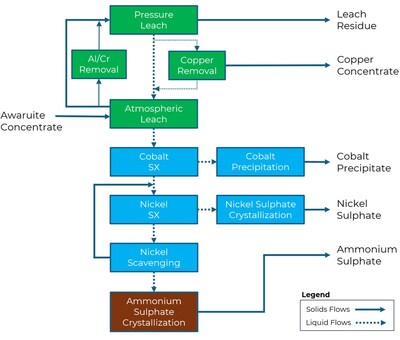FPX Nickel Commences Scoping Study to Develop North America's Largest Nickel Sulphate Refinery for the EV Battery Market
Highlights
- Value engineering studies highlight the strategic opportunity for FPX Nickel to develop
North America's largest battery metals refinery, with the capacity to produce 32,000 tonnes of nickel in nickel sulphate per year, enough to build about 450,000 electric vehicles annually - Building on previous engineering work outlined in the 2023
Baptiste Nickel Project ("Baptiste") preliminary feasibility study, optimization of the purification flowsheet has substantially improved the refinery operating margin while reducing waste handling and disposal risk - Pilot-scale testwork of the refinery flowsheet, with funding support from the
Government of Canada , is well progressed and results will be reported inOctober 2024 - FPX has commenced a standalone scoping study for the battery metals refinery, which will include a detailed technical and economic analysis, for publication in the first quarter of 2025
"Our refinery Value Engineering studies have substantially improved the business case and reduced the risk profile for a standalone refinery to convert awaruite concentrate into battery-grade nickel sulphate," commented
Background
The Baptiste 2023 preliminary feasibility study ("PFS") demonstrates the potential to develop a high-margin and low-carbon nickel mine producing an average of 59,100 tonnes per year of nickel over a 29-year mine life (see the Company's
While the PFS presents robust economics, including a Base Case after-tax NPV8% of
The key Value Engineering studies pursued by FPX in 2024 are:
- Mineral processing (see the Company's
July 10, 2024 news release) - Mine planning and engineering (see the Company's
July 30, 2024 ) - Refinery planning (described herein)
Refinery Engineering Studies
To demonstrate Baptiste's strategic flexibility to also produce nickel and cobalt for the battery material supply chain, the Refinery Option in the 2023 PFS envisioned the development of a standalone refinery to produce battery-grade nickel from awaruite concentrate. Located in an urban setting in central
Earlier this year, FPX commissioned a detailed technical review of the 2023 PFS Refinery Option, and executed refinery Value Engineering studies. No major risks were identified in the review of the PFS Refinery Option, and several tangible opportunities were highlighted for further evaluation during both the Value Engineering and subsequent study stages.
Most notable of the identified near-term opportunities was the refinery reagent scheme. The PFS Refinery Option assumed the use of caustic (a.k.a. sodium hydroxide, NaOH) as the neutralizing base, with caustic accounting for approximately 60% of the total operating cost. The use of caustic generates sodium sulphate (Na2SO4) as a byproduct, which is a low value commodity, has limited industrial uses, and is projected to be in significant over-supply as the battery material supply chain further develops.
Following a review of all potential reagent schemes, an ammonia-based flowsheet was selected as the best value for further evaluation. The ammonia-based flowsheet is similar to the sodium hydroxide flowsheet, except ammonia gas (or ammonium hydroxide when dissolved in water) is the reagent used in the process plant in solvent extraction operations. A similar flowsheet is used in Terrafame's nickel sulphate refinery in
Modifying the refinery flowsheet to an ammonia-based reagent scheme results in an immaterial increase to capital costs, but a material decrease in operating costs (given the significantly lower consumption rate for ammonia versus caustic). Additionally, the waste product of sodium sulphate, for which zero value was ascribed in the PFS Refinery Option, is now replaced by ammonium sulphate, a valuable fertilizer product. In addition to generating a significant new value source with a more stable future market outlook, the production of ammonium sulphate eliminates the previous waste handling/disposal risk associated with sodium sulphate production. Overall, this change results in a significant improvement to the operating margin and reduction in the project risk profile.
Refinery Testwork with Funding Support from
The previously announced pilot-scale testwork of the refinery flowsheet (see the Company's
The pilot testing campaign was funded in part by a
Refinery Scoping Study
Incorporating results of the refinery Value Engineering and testwork programs, FPX has commenced the preparation of a standalone awaruite refinery scoping study. Considering current off-take rights that have been granted to strategic investors, the refinery will have a capacity of 32,000 tonnes per year of contained nickel in battery-grade nickel sulphate. For the purposes of this study, the refinery location will continue to consider an urban location within central
Along with the improved business case and reduced risk profile, the standalone study will better present the strategic opportunity to meaningfully increase
About the
The
The Baptiste deposit is located within the territories, keyohs, and consultative boundaries of the Tl'azt'en Nation, Binche Whut'enne, Yekooche First Nation, and
About
On behalf of
"Martin Turenne"
Email: ceo@fpxnickel.com
Phone: 604-681-8600
Forward-Looking Statements
Certain of the statements made and information contained herein is considered "forward-looking information" within the meaning of applicable Canadian securities laws. These statements address future events and conditions and so involve inherent risks and uncertainties, as disclosed in the Company's periodic filings with Canadian securities regulators. Actual results could differ from those currently projected. The Company does not assume the obligation to update any forward-looking statement.
Neither the
SOURCE


